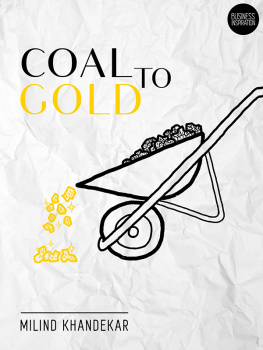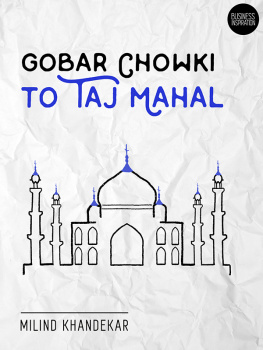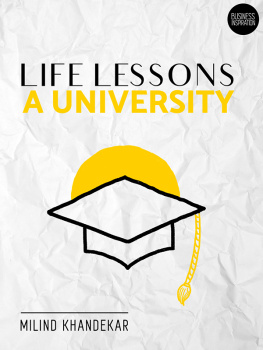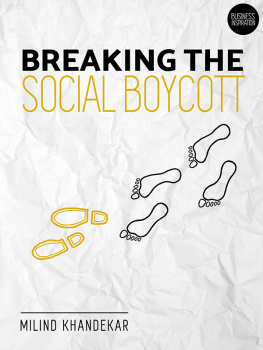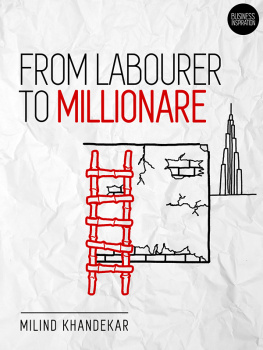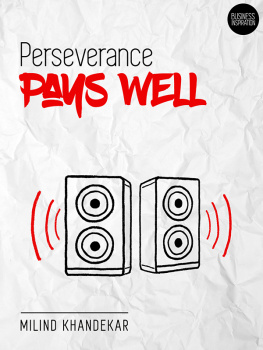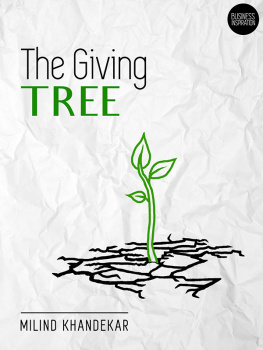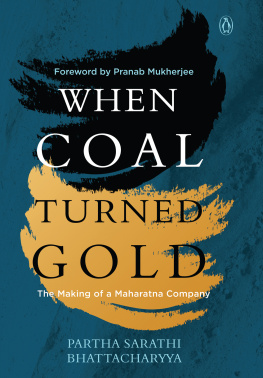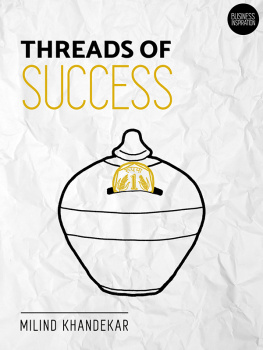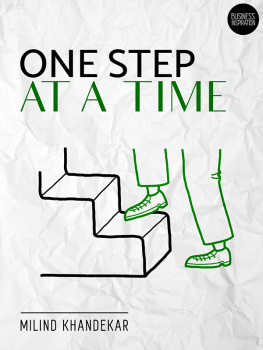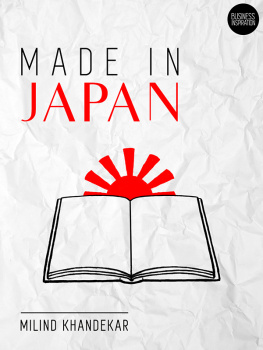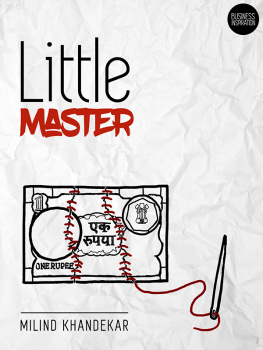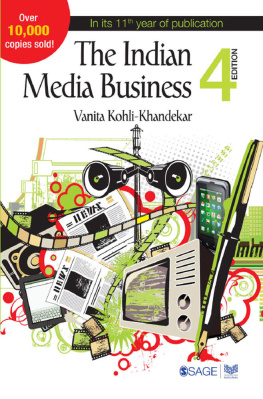Khandekar - COAL TO GOLD
Here you can read online Khandekar - COAL TO GOLD full text of the book (entire story) in english for free. Download pdf and epub, get meaning, cover and reviews about this ebook. year: 2017, publisher: Penguin Books Ltd, genre: Romance novel. Description of the work, (preface) as well as reviews are available. Best literature library LitArk.com created for fans of good reading and offers a wide selection of genres:
Romance novel
Science fiction
Adventure
Detective
Science
History
Home and family
Prose
Art
Politics
Computer
Non-fiction
Religion
Business
Children
Humor
Choose a favorite category and find really read worthwhile books. Enjoy immersion in the world of imagination, feel the emotions of the characters or learn something new for yourself, make an fascinating discovery.
- Book:COAL TO GOLD
- Author:
- Publisher:Penguin Books Ltd
- Genre:
- Year:2017
- Rating:4 / 5
- Favourites:Add to favourites
- Your mark:
- 80
- 1
- 2
- 3
- 4
- 5
COAL TO GOLD: summary, description and annotation
We offer to read an annotation, description, summary or preface (depends on what the author of the book "COAL TO GOLD" wrote himself). If you haven't found the necessary information about the book — write in the comments, we will try to find it.
COAL TO GOLD — read online for free the complete book (whole text) full work
Below is the text of the book, divided by pages. System saving the place of the last page read, allows you to conveniently read the book "COAL TO GOLD" online for free, without having to search again every time where you left off. Put a bookmark, and you can go to the page where you finished reading at any time.
Font size:
Interval:
Bookmark:





UK | Canada | Ireland | Australia
New Zealand | India | South Africa
Penguin Books is part of the Penguin Random House group of companies whose addresses can be found at global.penguinrandomhouse.com.

Copyright Milind Khandekar 2013
The moral right of the author has been asserted
This digital edition published in 2016.
e-ISBN: 978-9-386-65175-4
This book is sold subject to the condition that it shall not, by way of trade or otherwise, be lent, resold, hired out, or otherwise circulated without the publishers prior consent in any form of binding or cover other than that in which it is published and without a similar condition including this condition being imposed on the subsequent purchaser.


Let the conversation begin...
Follow the Penguin Twitter.com@PenguinIndia
Keep up-to-date with all our stories YouTube.com/PenguinIndia
Like Penguin Books on Facebook.com/PenguinIndia
Find out more about the author and
discover more stories like this at penguinbooksindia.com
PENGUIN
Milind Khandekar has over twenty-two years of experience in the field of journalism. He is currently managing editor at Media Content and Communications Services (I) Pvt. Ltd (MCCS), and looks after the editorial content of ABP News, ABP Ananda and ABP Majha. He has previously worked with the Navbharat Times and Aaj Tak. He is a product of the Times Centre for Media Studies, and received the Rajendra Mathur Award for best trainee (Hindi) in 1991.

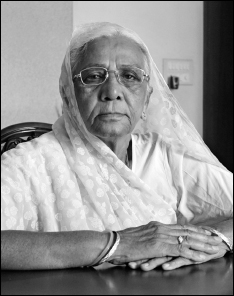
THOUGH IT HAS BEEN 4045 years, Savitaben still hasnt forgotten the days when her husband used to work as a conductor for the Municipal Transport Service in Ahmedabad and earned a meagre salary of Rs 60 a month. It was difficult to sustain a family of six childrenthree sons and three daughtersas well as her in-laws on such a small amount. Out of those Rs 60, Rs 15 was given to her in-laws; Rs 20 went towards repaying the loan her husband had taken for the weddings of his younger brothers; and Rs 5 was used towards the rent of the tiny 100-square-feet room the family lived inleaving Savitaben with only Rs 20 to run her house.
Ultimately, she decided that she would have to work too. But what could she have done without educational qualifications, for she had studied only up to class three. Her parents sold coal on a small scale. Savitaben had said to her mother: Why dont you give me some coal too? I will sell it and earn something. Her mother had replied: Take money from us if you want, but we cannot give you coal. If we do, then we wont be able to marry your sisters off.
On hearing this, Savitaben had taken neither money nor coal from her parents. If she had taken money from them that day, Savitaben Devjibhai Parmar wouldnt have come to be known as Savitaben Kolsawallah or Koylawallah to the whole of Gujarat.
Those days, Ahmedabad was known for its cloth mills, and the half-burnt coal which was the residue from these mills was sold off in the market. Savitaben began buying coal from these mills and recounts how she first sold itloaded on two carts, in the lanes of Ahmedabadand how she soon graduated to selling four cartloads of coal. In those days, the use of liquefied petroleum gas was not widespread, and in most homes, cooking was done on stoves fuelled by coal. Before setting off to supply coal for peoples kitchens, Savitaben would get up at 4 a.m. to prepare her husbands lunch, after which she would set off for the mill and sell coal during the day. Come evening, the whole family would get involved in spinning cotton yarn till midnightthey had got a spinning wheel from Khadi Gram Udyog, and received wages for the yarn in cash and in kind.
Today, Savitaben sells neither coal nor spun yarn. Her company, Sterling Ceramic Private Limited, situated near Ahmedabad, manufactures floor tiles for homes. On a factory visit, I noted how things at the plant, which manufactures 5000 square metres of Spartek tiles every day, were in full swing. A new plant is expected to begin production soon, and the companys turnover is expected to increase from Rs 15 to Rs 50 crore the following year.
Savitaben had to face additional discrimination on account of her being not only a Dalit but also a woman. However, she was lucky to have a good support system. In the beginning, it was difficult for her to even deposit the spun yarn at Khadi Gram Udyog in the evenings, as she had trouble stepping out of the house. It was her father-in-law who encouraged her to go ahead and do this work. She also had a lot of difficulty selling coal, and it was only after five or six years that she expanded her trade. At first, she began selling the half-burnt coal from the mills to owners of brick kilns; then she stopped dealing in half-burnt coal and began dealing in normal coal. Those were the days of the Licence Rajtraders would procure licences to obtain coal and outsource the selling of coal to agents.
Seeing Savitabens enterprise in dealing with the coal from the mills, a Jain trader outsourced his work to her. She remembers him fondly as Kaka, and says he transformed her life. His coal was obtained under the quota system and it arrived on two freight cars each month. But when Savitaben requested other traders to outsource their work to her, they refused on the grounds that she was a Dalit womanwhat would they do if she ran away with their coal one day? So Kaka became her guarantor, and Savitaben began selling most of the coal that arrived in Ahmedabads railway yard, as a commission agent.
With her business growing by leaps and bounds, Savitaben began to face a problem: her family still lived in a one-room tenement in a chawl in Girja Nagar, and she did not have an office to operate from. Savitabens eldest son, Mukesh, relates how they brokered a deal with the owner of a hotel near their chawlNeelam Hotelwhereby traders who wanted to buy coal could wait at the hotel and the owner would send someone to fetch Savitaben or her son. Savitabens three sons are not well educated, but they have been helping their mother from the very beginning.
A doctor, whose name Savitaben doesnt remember any more, used to eat at the same hotel every day and would observe how Savitaben conducted her business. He hailed from a small principality near Vadodara in Gujarat, and was so impressed that he offered Savitaben his house in the Meghani Nagar locality in Ahmedabad, saying that he had to, in any case, return to his native place on completing his education. In 1977, the cost of the house was Rs 45,000, but Savitaben was able to arrange only Rs 15,000the doctor said she could pay him the rest later.
Font size:
Interval:
Bookmark:
Similar books «COAL TO GOLD»
Look at similar books to COAL TO GOLD. We have selected literature similar in name and meaning in the hope of providing readers with more options to find new, interesting, not yet read works.
Discussion, reviews of the book COAL TO GOLD and just readers' own opinions. Leave your comments, write what you think about the work, its meaning or the main characters. Specify what exactly you liked and what you didn't like, and why you think so.

